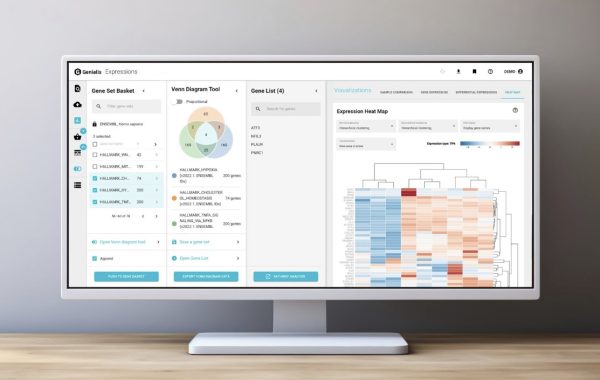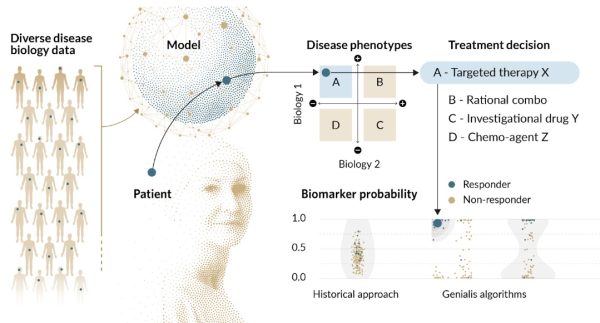Genialis is an RNA biomarker company unraveling complex biology to find new ways to treat disease. Genialis is building a world where healthcare delivers the best possible outcomes for patients, their families, and communities.
Pulse 2.0 interviewed Genialis co-founder and CEO Rafael Rosengarten, Ph.D., to learn more.
Rafael Rosengarten’s Background
Rosengarten is a trained biologist who never knew exactly what he wanted to be. And Rosengarten said:
“My first scientific love was marine biology and natural history. Still, as I studied more and spent more time in the laboratory, I increasingly wanted to understand mechanisms—how things worked. After a stint as a work-a-day cook (and a want-to-be chef) in some fancy restaurants, I went back to school and earned my Ph.D. at Yale in molecular, cellular, and developmental biology, investigating the evolution of immune recognition with Stephen Dellaporta. I then joined the synthetic biology team at Lawrence Berkeley National Laboratory’s Joint BioEnergy Institute, industrializing the construction of designer microbes and working with Jay Keasling and Nathan Hillson. My family life necessitated a move to Houston, where I went back into biomedical research, but in the Bay Area, I had caught the bug for developing technology with real commercial potential and societal importance.”
“I landed at Baylor College of Medicine (BCM) in the laboratories of Gad Shaulsky and Adam Kuspa, where I was selected for a fellowship sponsored by the National Institutes of Health National Library of Medicine in biomedical informatics. The two great things about this fellowship are that it (1) required cross-disciplinary training and (2) was implemented through the Gulf Coast Consortium, which included five other great research institutions. That meant I sought out collaborations with data scientists and enrolled in a machine learning (ML) course at next-door Rice University.”
“My chief data science collaborator was Professor Blaz Zupan, a computer scientist and world-class expert in artificial intelligence (AI) from Ljubljana, Slovenia, who has an appointment at BCM and would come to Houston for long stretches of time to work in our lab. Blaz brought over a series of his Ph.D. students, one more brilliant than the next, to engage with wet-lab biologists like me to apply their toolbox of software and algorithms to real-world problems in life science R&D. Over the years working with Blaz and his students, with the enthusiastic support of Gadi and Adam, I was overwhelmed by the realization that the application of AI to biomedicine was the future.”
“One of Blaz’s students I got to know was Miha Stajdohar, who had just completed his doctorate and had come to BCM to figure out pain points in biomedicine that could be disrupted by the technologies he had worked on as a Ph.D. student. Miha had started Genialis with a couple of co-founders in Slovenia and was looking for a US-based co-founder, preferably one who knew the life sciences. I decided this was the right move for me.”
Formation Of Genialis
How did the idea for Genialis come together? Rosengarten shared:
“From the start, we realized that as much potential as the new ML technologies held, the key bottleneck would be aggregating relevant data. Without the data as fuel, the algorithm engines couldn’t run. The other thing we realized is that most data in biomedicine is actually “small data,” consisting of only dozens or maybe a few hundred samples from lab experiments or clinical studies. So, we set out to build a software system to collect next-generation sequencing data and to harmonize small individual data sets into larger, more valuable metadatasets.”
“At the time (2015-2017), the ‘AI for drug discovery’ hype-wave was reaching a peak. Startups all over were popping up with “(dot) AI” in the URL and raising serious capital. Most of these focused their energies on early drug discovery, looking to differentiate new ways of identifying new drug targets, or the ability to design new drug molecules.”
“Genialis decided to apply its technology and know-how to the other end of the drug discovery journey—clinical development. We reasoned that we could have the biggest impact trying to address the unacceptable rates of clinical trial failure (96-97% in oncology), and the eye-popping cost ($1 – $2 billion at the time, now up to $6bn) of drug development to reach those late-stage failures. And if we were successful, not only would it be good for the industry, promising new medicines would finally reach patients who need them most.”
Favorite Memory
What has been Rosengarten’s favorite memory working for Genialis so far? Rosengarten reflected:
“This is a tough question. The most beautiful and rewarding part of Genialis is the team, the people. But since we’ve built the company as a multinational organization from the beginning (one shop in the US, the other in Slovenia), we don’t always get to spend as much time together as we’d like. My favorite memories are the ones in which we’ve made time for each other and come together for work and play. We held one executive strategy retreat sailing the Dalmatian islands in Croatia. And last winter, we built team consensus on our 3- and 10-year strategies in between ski runs at Bad Gastein, Austria. Sometimes, we just go out and hike and climb and let our friendships do the rest.”
“Scientifically/technologically speaking, we’ve had some great moments too. Maybe the highlight so far was helping one of our closest collaborators, a biotech company working on some really exciting new medicines, earn FDA acceptance of a novel clinical trial design using an algorithm we developed with them to help select patients most likely to benefit from their drugs.”
Challenges Faced
What are some of the challenges Rosengarten faced in building the company, and how has the current macroeconomic climate affected the company? Rosengarten acknowledged:
“We (and all startups) face three classes of challenges: (1) building the company; (2) building the business; and (3) building tech that solves the problem we aim to solve. Each one of these presents distinct hurdles. In the first case (company), as I’ve mentioned above, we work very hard to create and maintain an extraordinary culture, despite vast geographic distances and people with really diverse skill sets and personalities. In the second, business, we have to navigate a really tough macro-environment (biotech is struggling) to find the right balance of commercial collaboration versus in-house product development. Lastly, we face substantial technical risk because building AI models to predict patient outcomes to cancer therapy is just really complicated. We work so hard to get the science right, so when we do, it changes lives.”
Core Products
What are Genialis’ core products and features? Rosengarten explained:
“Genialis’ core product is ResponderID. ResponderID is a machine-learning framework for the discovery of biomarkers and the development of clinical applications. With ResponderID, Genialis builds biomarkers (computational models) that help match patients to effective cancer drugs and help shepherd the development of those drugs to the right diseases and patient subgroups.”
“ResponderID consists of lots of proprietary technology, including Genialis Expressions cloud software for ‘omics data analysis and management, validated gene signatures and algorithms, and harmonized data assets.”
Evolution Of Genialis’ Technology
How has Genialis’ technology evolved since launching? Rosengarten noted:
“We started with Expressions to solve the data aggregation and harmonization challenges. Then we developed ResponderID through years of hands-on work building biomarker models with biotech collaborators. We just relaunched a new version of Expressions, and ResponderID is improving every day as we bring in new data and develop more and better signatures and algorithms.”

Use Of AI
How does Genialis utilize AI for its products? Rosengarten pointed out:
“Artificial intelligence (AI) is on the tip of everyone’s tongue these days and, more often than not, in the context of fear or worry. Genialis espouses the viewpoint that AI will make healthcare more human, not less. At our company, patients and human data are at the center of our computational effort in pursuit of the most generally useful and impactful clinical applications. Geniais is an internationally recognized innovator in the domain of AI-enabled precision medicine. We have developed a first-of-its-kind biomarker algorithm that combines machine learning and RNA sequencing to serve as a pan-cancer, multi-drug diagnostic device.”
“In order to replicate and scale this success—to harness AI to the benefit of patients, families, and their communities—we need to ensure proper governance and guardrails are in place; that human experts remain “in the loop”; and that we maintain and open dialog between all stakeholders in the healthcare space, from technologists to clinicians, drug developers to regulatory bodies and policymakers.”
Significant Milestones
What have been some of Genialis’ most significant milestones? Rosengarten cited:
“Probably the biggest seal of approval for Expressions was a partnership we launched with Roche back in 2018, followed closely by a similar deal with Thermo Fisher in early 2019. Just a year later, we were co-publishing our lead biomarker program developed with a biotech collaborator and helped earn FDA acceptance of this biomarker for use in a pivotal clinical trial. Our most recent milestone was a Series A financing that we announced early this Spring.”
Customer Success Stories
Upon asking Rosengarten about customer success stories, he highlighted:
“With our close collaborators, we recently co-authored a paper on the Xerna TME Panel published in Frontiers in Oncology. Our work on this biomarker asset has been extremely fruitful for all parties, including presentations at every major oncology conference over the past three years, tangible impact on clinical trial design, and support of several exciting third-party commercialization agreements for the Xerna TME Panel.”
Funding
After asking Rosengarten about the company’s funding and revenues, he replied:
“We announced the close of our Series A in March, which was about $13 million in total. Historically we’ve achieved millions in annual revenue through a combination of software subscriptions, technology licenses, and tech-enabled services. Most of our work has been with pharma and biopharma. Increasingly we’re gaining traction with big diagnostic firms as well. With our current product lineup and new biomarker roadmap, we anticipate scaling the business considerably as we deepen our relationships in both the drug development and diagnostic markets.”
Total Addressable Market
What total addressable market (TAM) size is Genialis pursuing? “Billions,” Rosengarten assessed.
“According to Data Bridge Market Research, the market for cancer biomarkers will be valued at $51.14 billion globally with a compound annual growth rate (CAGR) of 13.11% by 2029. Further, GrandView Research valued the global artificial intelligence in healthcare market size at $15.4 billion in 2022 and says it is expected to expand at a CAGR of 37.5% from 2023 to 2030.
Differentiation From The Competition
What differentiates Genialis from its competition? Rosengarten affirmed:
“Genialis has solved a number of key challenges in the ‘translational’ space, that is, making things work in the human context. A combination of what we call a ‘People First’ approach to conceptualizing biomarkers, and the accompanying ResponderID technology portfolio, enables Genialis to build computational models that actually work on new patient data, and therefore are readily useful as clinical applications.”

(ResponderID)
Future Company Goals
What are some of Genialis’ future company goals? Rosengarten concluded:
“Company: We recently added an amazing class of new hires to our roster, with the aim of establishing a much more substantial presence in the US, while maintaining our culture and continuing our tradition of creating a fantastic place to work.
Business: We want to build products that help patients by meeting the needs of various biomedical audiences, including pharma, diagnostics, payors, and providers.
Technology/Science: We are developing a meta-model that will serve as a comprehensive map of cancer biology.”


